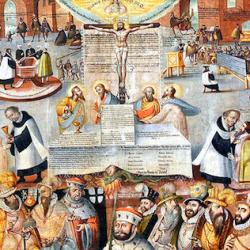One the features of denominational Christianity highlighted by David Martin is a distinctive mode of sacramental theology that he labels “subjective.” Unlike sects, denominations retain sacraments; unlike the church, the sacrament is less the work of God than the expression of the worshiper. The contours of his characterization are worth noting:
“As with the ministry so also with the sacraments themselves: the forms may be retained but the content is different. Denominations often appear to have a very Catholic theory of the sacraments, but the verbal similarities are misleading. Doctrinal formulations may even refer to the ‘real presence,’ but this signifies the reality of the presence of God in the hearts of the believers, not in the elements themselves. To the believer this is a perfectly objective form of sacramental theory, but as compared to the churchly theory, whether Roman, Orthodox, Anglican, or Lutheran, it is entirely subjective. This subjectivity likewise exists in relation to the sacrament of infant baptism, in which, if it is retained, the emphasis shifts from what is ‘done’ for the child, to the dedication of the parents. Indeed such a subjective approach affects the whole area of ritual practice: the forms are everywhere instrumental rather than intrinsic. They subserve religious values but they do not constitute part of those values in their own right, except in so far as a certain sanctity attaches to them by association. What for the church of Rome is Opus Dei for denominational Protestants is a form of words which happens to satisfy their religious requirements” (7-8).
A few observations on this. First, Martin’s scheme doesn’t encompass all of the alternatives. It is certainly possible to have a sacramental theology that is “objective” by most standards without claiming that the elements narrowly considered are the carriers of real presence.
But, second, Martin seems to be right in emphasizing that denominational organization, rather than the doctrines and practices of a particular denomination, determine ritual theory and practice. American Presbyterians, in other words, treat infant baptism as they do not because they are Presbyterians but because they are part of an American denominational system. This might explain why any effort to nudge the sacramental theology of a particular denomination meets with such resistance: What is being defended is not the Westminster Confession or some other doctrinal standard, but the whole structure of American Christianity.
And this suggests in turn that sacramental theology might provide a wedge with which to open some space between American churches and the denominational system in which they are embedded. Should denominations shift their sacramental theologies, could they continue to be denominations in the same sense?















